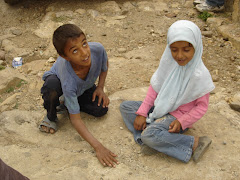The Guardian has a great article on the reconstruction in Afghanistan. I'm knee-deep in a paper right now on free-market reforms and contracting, so it caught my eye on the Angry Arab's blog. I reproduce the article in its entirety below:
Richard Norton-Taylor
March 25 2008.
Afghanistan is being deprived of $10bn (£5bn) of promised aid, and 40% of the money that has been delivered was spent on corporate profits and consultancy fees, according to a hard-hitting report by aid agencies released today.
The failure of western donors to keep their promises, compounded by corruption and inefficiency, is undermining the prospects for peace in Afghanistan, it warns.
Civil aid programmes are a fraction of what is spent by America, Britain and other countries on military operations there. Much of the money earmarked for aid is diverted to political or military purposes.
The report by Acbar, an alliance of international aid agencies working in the country, including Oxfam, Christian Aid, Islamic Relief and Save the Children, says the international community has pledged $25bn to Afghanistan since 2001 but only $15bn has been delivered.
The US is the biggest donor to Afghanistan but is also responsible for one of the biggest shortfalls. The US delivered only half of the $10.4bn it committed between 2002 and 2008, according to the Afghan government, today's report says.
Over the same period the European commission and Germany distributed less than two-thirds of their respective $1.7bn and $1.2bn commitments while the World Bank distributed just over half of the $1.6bn it committed. Britain pledged $1.45bn and distributed almost all, $1.3bn.
The report estimated that 40% of the aid money spent in Afghanistan has found its way back to rich donor countries such as the US through corporate profits, consultants' salaries and other costs, significantly inflating the cost of projects.
For example, a road between the centre of Kabul and the international airport cost over $2.3m per kilometre in US aid money, at least four times the average cost of building a road in Afghanistan, today's report says.
Afghanistan's biggest donor, USAid, allocates nearly half its funds to five big contractors. The US government has awarded major contracts, some worth hundreds of millions of dollars, to KBR, the Louis Berger group, Chemonics International, Bearing Point, and Dyncorp International, according to a study by the US-based Centre for Public Integrity quoted in today's report.
Most full-time expatriate consultants working for private companies in Afghanistan cost between $250,000 and $500,000 a year, including salary, allowances and associated costs, the report adds.
Some 90% of all public spending in Afghanistan comes from international aid. The huge shortfall hinders efforts to rebuild infrastructure damaged by over two decades of war, and the delivery of essential services such as education and health, the report says.
Matt Waldman, Oxfam's Afghanistan policy adviser and the report's author, said last night: "The reconstruction of Afghanistan requires a sustained and substantial commitment of aid - but donors have failed to meet their aid pledges to Afghanistan. Too much aid from rich countries is wasted, ineffective or uncoordinated.
"Spending on tackling poverty is a fraction of what is spent on military operations. While the US military is currently spending $100m a day in Afghanistan, aid spent by all donors since 2001 is on average less than a tenth of that - just $7m a day.
"Given the slow pace of progress in Afghanistan, and the links between poverty and conflict, the international community must urgently get its act together".
The report says some degree of donor under-spending could be expected because of the lack of government capacity, large-scale corruption, and difficult security conditions. But the size of the shortfall highlights the need for donors making better efforts to face up to the problem.
The report also shows that a disproportionate amount of aid follows the conflict and is being used for political and military objectives rather than reducing poverty.
"This is a short-sighted policy," said Waldman. "There must be strong support for development in the south but if other provinces are neglected then insecurity could spread."
The report says the volume of aid, particularly to rural areas, should be increased, aid donors should be more open about what they want to provide and cooperate better with the Afghan government.
There should be better ways to measure the impact, efficiency, and relevance of aid money, and an independent commission to monitor the appropriateness and effectiveness of donors' programmes, should be set up, it says.
Tuesday, March 25, 2008
Subscribe to:
Post Comments (Atom)

No comments:
Post a Comment